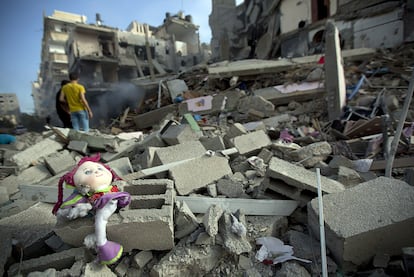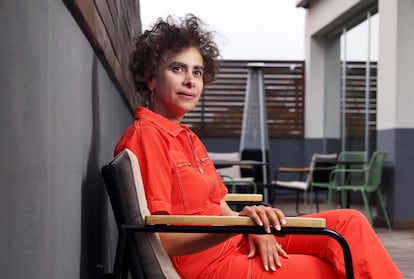The Palestinian writer Adania Shibli (Galilee, 50 years old) narrates in her novel A minor detail (Tin Sheet) the gang rape and murder of a young Palestinian woman by Israeli soldiers in the Negev desert, in 1949, shortly after the creation of the State of Israel, the expulsion of the inhabitants who already resided there ( known as Nakba, or Catastrophe) and in the middle of the Arab-Israeli war. Is it a duty for Palestinian writers to address the oppression of their people in their texts? “The only duty of a writer is to write. But writing about the occupation is a commitment to reality and to expanding its limits to create something where we all fit,” says Shibli (curly hair, some gray locks, orange jumpsuit) on the terrace of the hotel where he is staying for the rest of the year. his visit to the Madrid Book Fair.
His tour passes through Barcelona, Asturias or Santiago and a large audience has attended his presentations. “I’m a writer, I’m not used to being treated like a star rock and roll“, he said at the event held in Mieres, according to the Asturian media. Norths. In Madrid she participated in the Fair, also before a packed auditorium, in the company of the Arabist Luz Gómez. Her celebrity, in addition to her substantial literature, is due to the fact that her award at the last Frankfurt Fair, last October, was canceled when it coincided with the Israeli bombings on Gaza.
“The award is postponed. Perhaps the handover ceremony can be held in the future. Maybe they are waiting for the book to get better over time,” she says sardonically, as if the books were bottles of wine. But she draws a lesson: that literature happens in the margins and that, despite the opposition of fairs or the action of governments, reading continues. “That comforts me, that reading continues unstoppably in people’s daily lives,” she adds.
A minor detail, translated from Arabic by Salvador Peña Martín, is a narrative in two parts in which the style is intertwined with the content. In the first, the criminal events of 1949, the multiple rape and murder of the young Palestinian woman, are recounted, with a slow, monotonous, very detailed rhythm, which explains each action without too many explanations, in camera mode. Many poetic flashes (the insect bite, the suffocating heat, the barking of the dogs) seem to have a symbolism that is sometimes difficult to interpret. “This is how crimes are usually reconstructed, with a very clear and thorough point of view, and from the point of view of the criminal,” says the writer. It is the language of power.
In the second part, 25 years later, a researcher whose identity is not made explicit moves through the occupied territories of Palestine trying to clarify that past event. In this case the style is still meticulous, detailed, but the spirit is different: there is haste, obsession, confusion. It is the point of view of the victims. “Their language is broken, they don’t know where to start and where to end, they are confused, they mutter. “It is a typical language of the Palestinian context,” says Shibli, who prefers not to talk about “conflict,” but rather about unequal violence between the parties. An oppression.
“Travel, movement, are very important in Arabic narrative and poetry,” explains Shibli. This chapter is all movement, almost a road movie that follows the erratic steps of the researcher (the author points out the spirit of errances beatniks by Jack Kerouac) who leaves his office in Ramallah, where, during his work day, the Israelis have demolished a nearby Palestinian building and filled it all with dust, in an event that is now part of everyday life. A wandering that also serves to highlight the difficulties of normal life under occupation, when the citizens’ path is littered with walls and checkpointssome fixed, some floating, which make the days unbearable and humiliating.
The importance of the territory for the Palestinians shines through, a people who have been fighting for land for decades, a disputed land, as Shibli reflects, in the variety of maps that the protagonist weighs: some Israeli, others Palestinian, some old, others modern. The map as the center of the dispute, as a generator of tragedy. “The first indicator of how language plays with us is when we open a map and do not find the word Palestine. There are many Arab villages that were destroyed in 1948 (with the creation of Israel) and do not appear on maps, but they continue to exist in the language of my parents. We feel them like a phantom limb. They force us to live in the territory of the unwritten,” says Shibli. Another violence in language is the description of Palestinians as animals rather than humans. “Maybe now that description is given on a more official level but we have grown up with that; and it is not unusual either: it is something common against colonized peoples.”

The writer denounces not only violence in language, but also violence against nature. “In the middle of Gaza there is a valley through which migratory birds pass. With all this destruction, how are they going to find their trees, their houses? Since I was a child I have been listening to Israeli officials who are going to make the desert bloom, but what I have seen is how they destroy the olive and almond trees of the Palestinians. Nature becomes the enemy,” she points out.
From the title, the work emphasizes the importance of minor details to understand the big picture of things, perhaps that is why his writing is so dedicated to the small aspects that can go unnoticed. “The important thing is the details: I try to recreate in my writing the literary sensibility that I grew up with,” he says. “In Palestine, the main things are attacked and destroyed, only the small things are allowed because the oppressor does not pay attention. If your building is destroyed, you can cling to small things to escape oppression. That’s why they become dear to you. They are almost a secret, an echo, a whisper. You can transform total destruction into creation thanks to these small details.” His story brings to mind the images of Gazan citizens wandering from one place to another with their things on their backs, in a wasteland of devastated cities.
What is it like witnessing the destruction of Gaza first hand? “Every day is a little worse, and accepting that drives you crazy, and not in a metaphorical sense,” says the author, who lives between Germany and Palestine. “Every day you have to find new ways to deal with that mess: you feel alienated and disoriented in your own life.”
Subscribe to continue reading
Read without limits
_

